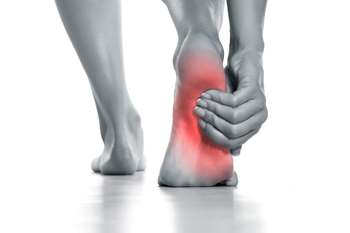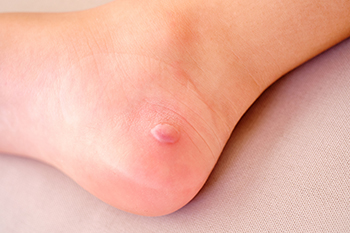Connect With Us
Blog
Sources of Foot Pain

Foot pain can stem from plantar fasciitis, tendonitis, bunions, or arthritis. Plantar fasciitis causes sharp pain in the heel, particularly with the first steps in the morning. Tendonitis involves inflammation of the tendons, leading to pain, swelling, and limited movement, often affecting the arch or back of the foot. A bunion is a bony bump at the base of the big toe, making it painful to wear shoes and walk. Arthritis in the foot causes joint pain, stiffness, and swelling, often worsening with activity. The causes of foot pain vary, but common factors include overuse, wearing improper footwear, abnormal foot structure, or aging. Symptoms often include swelling, tenderness, and difficulty moving or bearing weight on the affected foot. A podiatrist can assess your symptoms and provide treatment options, including targeted exercises, custom orthotics, medication, or surgery, if needed. If you have ongoing foot pain, it is suggested that you schedule an appointment with a podiatrist.
Foot Pain
Foot pain can be extremely painful and debilitating. If you have a foot pain, consult with one of our podiatrists from Foot & Ankle Associates of Maine. Our doctors will assess your condition and provide you with quality foot and ankle treatment.
Causes
Foot pain is a very broad condition that could be caused by one or more ailments. The most common include:
- Bunions
- Hammertoes
- Plantar Fasciitis
- Bone Spurs
- Corns
- Tarsal Tunnel Syndrome
- Ingrown Toenails
- Arthritis (such as Gout, Rheumatoid, and Osteoarthritis)
- Flat Feet
- Injury (from stress fractures, broken toe, foot, ankle, Achilles tendon ruptures, and sprains)
- And more
Diagnosis
To figure out the cause of foot pain, podiatrists utilize several different methods. This can range from simple visual inspections and sensation tests to X-rays and MRI scans. Prior medical history, family medical history, and any recent physical traumatic events will all be taken into consideration for a proper diagnosis.
Treatment
Treatment depends upon the cause of the foot pain. Whether it is resting, staying off the foot, or having surgery; podiatrists have a number of treatment options available for foot pain.
If you have any questions, please feel free to contact our office located in Brunswick, ME . We offer the newest diagnostic and treatment technologies for all your foot care needs.
Are You Suffering From Nerve Damage?
Neuropathy and Checking the Feet

Another name for neuropathy is nerve damage. Common symptoms that neuropathy causes are total numbness or a tingling sensation in the feet. The feet may also turn blue and feel cold. This is a condition that is prevalent among diabetic patients, and the lack of feeling on the soles of the feet calls for a need to check the feet daily for cuts that may have developed. Patients who have chronic alcoholism may be at an increased risk for developing this condition, in addition to people who have a vitamin B12 deficiency. Neuropathy falls into three categories, consisting of mono, poly, and distal symmetric polyneuropathy. The former is generally caused by an injury, and affects one nerve. Multiple nerves are affected in patients who have polyneuropathy, and may create blood pressure or gastrointestinal symptoms. The latter may be more prevalent among people who have diabetes, and the upper extremities may become affected. If your feet are numb, it is strongly suggested that you are under the care of a podiatrist who can accurately diagnose and treat neuropathy.
Neuropathy
Neuropathy can be a potentially serious condition, especially if it is left undiagnosed. If you have any concerns that you may be experiencing nerve loss in your feet, consult with one of our podiatrists from Foot & Ankle Associates of Maine. Our doctors will assess your condition and provide you with quality foot and ankle treatment for neuropathy.
What Is Neuropathy?
Neuropathy is a condition that leads to damage to the nerves in the body. Peripheral neuropathy, or neuropathy that affects your peripheral nervous system, usually occurs in the feet. Neuropathy can be triggered by a number of different causes. Such causes include diabetes, infections, cancers, disorders, and toxic substances.
Symptoms of Neuropathy Include:
- Numbness
- Sensation loss
- Prickling and tingling sensations
- Throbbing, freezing, burning pains
- Muscle weakness
Those with diabetes are at serious risk due to being unable to feel an ulcer on their feet. Diabetics usually also suffer from poor blood circulation. This can lead to the wound not healing, infections occurring, and the limb may have to be amputated.
Treatment
To treat neuropathy in the foot, podiatrists will first diagnose the cause of the neuropathy. Figuring out the underlying cause of the neuropathy will allow the podiatrist to prescribe the best treatment, whether it be caused by diabetes, toxic substance exposure, infection, etc. If the nerve has not died, then it’s possible that sensation may be able to return to the foot.
Pain medication may be issued for pain. Electrical nerve stimulation can be used to stimulate nerves. If the neuropathy is caused from pressure on the nerves, then surgery may be necessary.
If you have any questions, please feel free to contact our office located in Brunswick, ME . We offer the newest diagnostic and treatment technologies for all your foot care needs.
Why Did I Get a Foot Blister?

A foot blister is a small, fluid-filled sac that forms on the skin due to irritation or damage. It is often caused by friction, which occurs when shoes or socks repeatedly rub against the skin. Heat and moisture can also contribute to blister formation, especially in warm environments where excessive sweating softens the skin. Allergic reactions to certain materials in footwear or socks may trigger blisters as well. Some medical conditions, such as diabetes, eczema, or infections, can make individuals more prone to developing blisters. Symptoms include redness, swelling, tenderness, and a sensation of warmth surrounding the affected area. Blisters can become infected and may cause difficulty in completing daily activities. If you have a blister anywhere on your foot, it is suggested that you contact a podiatrist who offers safe and sterile treatment before it becomes infected.
Blisters may appear as a single bubble or in a cluster. They can cause a lot of pain and may be filled with pus, blood, or watery serum. If your feet are hurting, contact one of our podiatrists of Foot & Ankle Associates of Maine. Our doctors can provide the care you need to keep you pain-free and on your feet.
Foot Blisters
Foot blisters are often the result of friction. This happens due to the constant rubbing from shoes, which can lead to pain.
What Are Foot Blisters?
A foot blister is a small fluid-filled pocket that forms on the upper-most layer of the skin. Blisters are filled with clear fluid and can lead to blood drainage or pus if the area becomes infected.
Symptoms
(Blister symptoms may vary depending on what is causing them)
- Bubble of skin filled with fluid
- Redness
- Moderate to severe pain
- Itching
Prevention & Treatment
In order to prevent blisters, you should be sure to wear comfortable shoes with socks that cushion your feet and absorb sweat. Breaking a blister open may increase your chances of developing an infection. However, if your blister breaks, you should wash the area with soap and water immediately and then apply a bandage to the affected area. If your blisters cause severe pain it is important that you call your podiatrist right away.
If you have any questions, please feel free to contact our office located in Brunswick, ME . We offer the newest diagnostic and treatment technologies for all your foot care needs.

